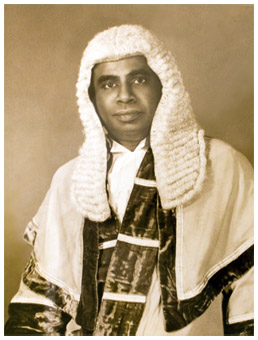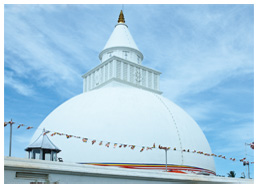
Sir Cyril de Zoysa and the Kalutara Bōdhi Trust
“Death comes to all but great achievements build a monument which shall endure until the sun grows cold.”
George Fabricius 1678-1707
The legacy of Sir Cyril de Zoysa, the founder of the Kalutara Bōdhi Trust, is every bit a monument which shall certainly endure until the sun grows cold. He was simply a colossus whose endless and multifaceted list of achievements sets him apart as one of the truly great sons of Sri Lanka. Indeed, few can match his accomplishments in the spheres of religion, politics, commerce and of course, philanthropy.
Sir Cyril was born on 26th October 1896, the second of five children to Solomon de Zoysa, Notary Public and Harriet de Abrew, who hailed from Balapitiya, on the West Coast of Sri Lanka. He schooled at St. Thomas’s College, Matara, Richmond College, Galle and Royal College, Colombo, before entering Law College.
As a young man, Sir Cyril displayed a single-minded capacity for excellence and hard work in diverse fields of interest, in all of which he excelled. He was a supremely vibrant and confident person who feared none. Nor did he fear a challenge. Indeed, he faced any obstacle head on, and the greater the challenge, the more resilient he became. But despite his inherent strength of character and his unwavering self-confidence, his disposition was never one of arrogance and conceit. He was simply a most persuasive man.
Sir Cyril’s accomplishments were extensive as they were varied. He was a lawyer of eminence, a Knight of the British Empire and a pioneering industrialist. He was chairman of the Swarnapali Bus Company, which subsequently became the South Western Bus Company; proprietor of two large petrol stations; founder of the Balapitiya Textile Weavers’ training and production unit; and chairman of Associated Motorways Ltd., where he inspired the setting up of several other associated businesses – all of which generated employment for scores of people.
President of the National Council of the Blind and the Deaf; Chairman of the Ceylon National Association for the Prevention of Tuberculosis (CNAPT); founder of the Institute of Personnel Management; founder of a Boys’ School, Kalutara Vidyālaya and a Girls’ School, Bālika Vidyālaya, in Kalutara. He was President of the Young Men’s Buddhist Association (YMBA) for nearly 19 years from 1960 until his demise in 1978. He was the President of the Senate, the Higher Chamber of Parliament, from 1955 to 1961.
Sir Cyril also revived the London Buddhist Vihāra which was fading away into oblivion. He led the way in obtaining a four-storey building in Ovington Gardens, London, on a ten-year lease and the Vihāra re-opened for Vesak in 1954. Sir Cyril himself underwrote the annual rent of £700.00 for the full ten years. The Buddhist revival ushered in by Anagārika Dharmapāla, inspired the common man of the land and this culminated in the cultural resurgence of 1956. Sir Cyril was very much inspired as well and he became actively involved in pursuing these ideals of the time.
Sir Cyril’s life-time achievements left an indelible mark on his country. The effects of his remarkable work will surely be felt for generations to come. Arguably, the pinnacle of his accomplishments was the restoration and protection of the Kalutara Bōdhi, culminating in the construction of the magnificent caitya beside the picturesque Kalu Ganga (Black River).
The Kalutara Bōdhi
Sir Cyril’s association with the Kalutara Bōdhi began while he was a practising lawyer at the Kalutara Bar. A logger named Sendanayake, who supplied coal to the Railway Department, first alerted Sir Cyril to the state of neglect into which the revered Bōdhi tree and its premises had fallen. Sendanayake had in fact been paying the princely sum of one rupee annually to the British Government Agent so as to light a lamp and offer a handful of flowers before the revered Bōdhi Tree. As it transpired, the solitary flickering wick at the hands of Sendanayake, grew into an undying light at the hands of Sir Cyril.
The Kalutara Bōdhi is a most historic symbol of Buddhism in Kalutara. The venerated Bōdhi Tree lies in the Uda Maluva or the high ground of the sacred area. During the colonial era, the Galle Road was built between the Uda Maluva and the Pahala Maluva, splitting the site into two separate sections.
The Bōdhi premises was thus shared with the Government Agent’s office which nevertheless inconvenienced both the Bōdhi devotees and the general public who sought government related services. As a consequence, Sir Cyril was able to persuade the Government to move its Agent’s offices to a new location, so as to allow development and restoration of the Bōdhi premises.
Having secured the land for his ambitious plan, Sir Cyril set in motion plans for building a hollow dāgoba with great energy and dynamism. In consultation with the well-known engineer of the day, Dr. A.N.S.Kulasinghe, blueprints were drawn for a modern-day engineering marvel.
Built upon a pre-stressed concrete frame, the caitya has a diameter of 95 feet and a circumference of 300 feet. The foundation for the imposing structure was laid in 1964, and after ten years of work the pinnacle of the caitya was laid in January of 1974.
The pinnacle was unveiled and relics deposited in the inner chamber on 28th February, 1980. Today, the magnificent structure is an imposing and gloriou spectacle lying as it were at the entrance to the Kalutara town.
Having achieved his first objective with the construction of the caitya, Sir Cyril’s next goal was to ensure its long-term sustainability. This led to the establishment of the Kalutara Bōdhi Trust. KBT was set up as a two-fold mechanism so as to ensure the continued maintenance of the Kalutara Bōdhi on the one hand, while funding on-going philanthropic work on the other. KBT administers funds received primarily through donations made by passers-by at the tills placed along the boundaries of the premises along the Galle Road. Some of these funds are utilised for the maintenance of buildings and structures within the premises but the greater part is dispensed towards charitable and social causes.
Although the Kalutara Bōdhi restoration was probably his greatest feat, Sir Cyril’s other acts of philanthropy and work towards the upliftment of Buddhist culture cannot go unmentioned. To name a few, he was instrumental in sourcing funds for the building of the Young Men’s Buddhist Association Mandiraya in the Colombo Fort. He was also responsible for providing the Sacred City of Kataragama a much needed facelift and restoring the magnificent Kiri Vehera caitya by founding the Kiri Vehera Restoration Society.
He also bestowed on Kataragama a comfortable Pilgrims’ Rest, as there was a scarcity of accommodation for the thousands of devotees that flock to the city during its famed perahera or Buddhist pageant. Here, Sir Cyril’s contribution was recently etched in stone with the erection of his statue on the premises at Kataragama. The cost of erecting his statue at Kataragama was borne by the present Chairman of KBT, Mr Ajita de Zoysa, just as costs of erecting his statue at the Bōdhi premises were borne by Sir Cyril’s relatives.


Sir Cyril served as the Vice President of the Young Men’s Buddhist Association (YMBA) (and later as the longest serving President for 19 years) where he acted boldly to launch multi-faceted programmes revolving around society, education and health. Sir Cyril was always conscious of continuity and long term sustainability in whatever he did. He found in his brother, V.T. de Zoysa, an equally dedicated and able partner in his mission. Today, those very traits and lessons have been passed on to the next generation through his brother’s sons – Ajita and Tilak – who now carry on the extraordinary legacy of their uncle, Sir Cyril de Zoysa
